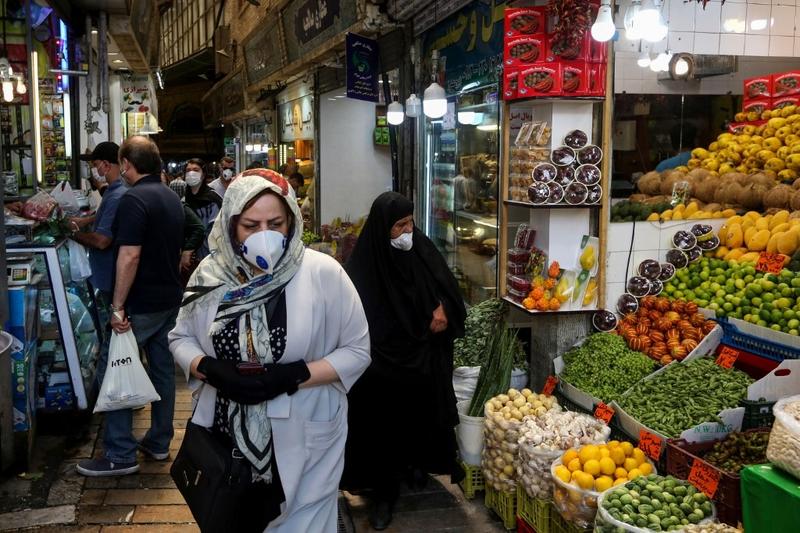 Iranians, some wearing protective gear amid the COVID-19 pandemic, shop at the Tajrish Bazaar market in the capital Tehran on July 14, 2020. (PHOTO / AFP)
Iranians, some wearing protective gear amid the COVID-19 pandemic, shop at the Tajrish Bazaar market in the capital Tehran on July 14, 2020. (PHOTO / AFP)
LONDON / SAO PAULO / SEOUL - Iran, creaking under the impact of US sanctions, a collapse in oil sales and a severe COVID-19 epidemic, is scrambling to buy food and medicine to avoid a supply crunch. But it’s a struggle.
Despite such supplies being exempt from sanctions, banks and governments are reluctant to transfer or take Iranian money because they fear unwittingly breaching the complex US restrictions, according to five trade and finance sources.
An approved trade channel launched by the Swiss government, and backed by Washington - the Swiss Humanitarian Trade Agreement (SHTA) - went live in February after over a year of work to facilitate such Iranian purchases from Swiss companies.
Yet Iran’s central bank (CBI) has been unable to transfer the billions of dollars worth of oil export cash it had built up between 2016 and 2018 to bank accounts working with the SHTA, the five sources with knowledge of the matter told Reuters.
ALSO READ: Iran urges lifting 'inhuman' US sanctions amid COVID-19 epidemic
That money was accumulated in bank accounts in countries that Iran sold oil to, especially in Asia, with its biggest customers including South Korea and Japan, in the years after Iran signed the nuclear accord with world powers, but before the Trump administration withdrew and reimposed sanctions in 2018.
The funds were frozen when the sanctions, which target the CBI as well as dollar transactions with Iranian entities, were reintroduced. As a result, international banks and their governments - whom they seek clearance from - are wary of allowing funds to be released without specific authorisation from Washington for each transfer, the sources said.
The blockage, according to the sources, illustrates how the complexity of US sanctions has made many banks, companies and countries wary of doing any business with Iran, even when exemptions exist, because breaches can involve huge financial penalties and being effectively shut out of the crucial US financial system.
The impact has also been felt in other areas, with Reuters previously reporting many foreign shipping companies and insurers are unwilling to provide vessels or cover for voyages, even for approved commerce.
Soth Korea, Japan
South Korean and Japanese authorities have declined cash transfers to Switzerland by the CBI without specific US approval, according to the sources, who declined to be named due to the sensitivity of the matter.
The South Korean foreign ministry confirmed this.
“Under the current US sanctions, returning the money in cash is impossible,” an official told Reuters. “Any permission regarding the funds need to be strictly authorized by the US”
The foreign ministry official said Seoul had “discussed the Swiss route as another possible way of clearance (of funds)” but added that the “US hasn’t been positive about such proposals”.
It is unclear why the United States might not have given specific approval for those transactions.
A Japanese finance ministry official declined to comment and referred the matter to Iranian authorities.
The CBI did not respond to requests for comment.
When asked whether such transfers of funds were permitted and whether it would give specific authorisations, a US Treasury spokesperson said the United States was committed to the delivery of humanitarian goods and services to the Iranian people.
Non US nationals could engage in the export or re-export of food, agricultural products, medicine, and medical devices to Iran outside of US jurisdiction without additional authorization provided transactions involving the CBI were consistent with US guidance, the spokesperson added.
A State Department spokesperson said the United States remained committed to the success of the SHTA.
“It has never been, nor is it now, US policy to target humanitarian trade with Iran,” it added.
READ MORE: Iran says unable to receive FIFA financial aid due to sanctions
One Swiss Deal Done
Switzerland’s government said on Monday that a Swiss pharmaceutical company had completed the first transaction under the new humanitarian trade channel with Iran, adding more transactions would follow.
The State Secretariat for Economic Affairs (SECO) told Reuters that the SHTA needed “regular transfers of Iranian funds from abroad for its functioning”, adding that US authorities had given assurances that they would support such transfers.
“We are in talks with the USA and other partners on this matter. However, we cannot provide information on individual transfers,” SECO said, without providing further details.
SECO also did not comment on how the first confirmed transaction was funded.
An Iranian official, speaking on condition of anonymity, said Tehran had been in contact with countries where it had funds to try to transfer the money under the Swiss initiative.
“These countries have approached the US to secure its approval for such a transfer, but to no avail,” the official said.
Swiss bank BCP is the only financial institution that has committed to the SHTA so far and agreed to receive Iranian funds under the scheme, the sources said.


